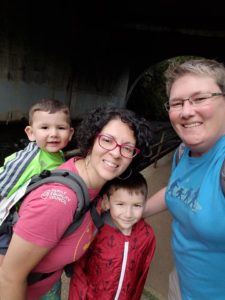To mark Latinx Heritage Month, we asked our community to share stories about how their Latinx identities intersect with their identity as an LGBTQ family. In this story, Tatiana Quiroga, Director of National Family Networks for Family Equality Council, shares how her Bolivian heritage has shaped the family that she and her wife Jen have formed.

Leaving everything they knew behind, my young parents came to this country with a two-year-old and a suitcase. Like most immigrants, they came full of hope and dreams of a better life. Not even speaking the language, my father enrolled into Northeastern University and earned his Civil Engineering degree. He later went on to MIT. My parents always taught me to work hard, to persevere, and to be proud of who we were and where we came from.
I was born in La Paz, Bolivia, a landlocked country in the heart of Latin America. I traveled there often to visit my maternal grandparents, whom I was very close to. They understood my parents’ struggles in a foreign land. My grandfather went to Harvard University’s Medical School on a Fulbright Scholarship, but returned to La Paz to practice. My parents were under so much pressure to not just survive, but to thrive in the United States. Failure was not an option. Because of that, I was often reminded of the sacrifices and challenges that they faced to make a better life for me. In return, they expected gratitude, obedience, and success.
Raised between two cultures, two languages, and two worlds was confusing. American traditions like Halloween, Thanksgiving, sleepovers, and going away to college were foreign to my family. My mind was in a constant struggle trying to balance out these two battling worlds, and never feeling like I truly fit into one or the other. At 18-years-old, I came out, which added a third piece to the mix. In my very traditional Latino family, this was disgraceful, devastating, and heartbreaking news. Everything my parents had overcome and sacrificed for was gone. I had failed them. I had failed my whole family. I had failed my tradition, my culture, and the future they had envisioned for me.
However, my parents’ life lessons of hard work, perseverance, resiliency, and pride in my identity never left me. I met my wife and we got married. We embarked on our own journey to create a family. Since I was not able to carry, we decided my wife would be the gestational carrier and bio parent. Quickly, our discussions about race began. We wanted to find a Latino donor with a similar cultural background and physical characteristics to me. This proved to be a challenge. The options for donors of color were very limited. We were thrilled when we found a donor from a neighboring Latin American country. With his help, we now have two beautiful sons and are a very proud transracial family.
The boys are light brown. Mami is brown and Momma is white. Race, ethnicity, and culture are a constant conversation at our house. The boys are being raised bilingual and bicultural. However, it is not without challenges and unanswered questions. Since time and love have a way of changing people’s hearts and minds, my parents are now in our lives and our boys adore their abuelitos. The boys are being raised within Bolivian culture: eating the food, celebrating traditions, and being surrounded by my loving extended family. For now, my wife and I identify them as American and Bolivian. However, their donor was not Bolivian. According to their genetics, they are not Bolivian. As parents, we know it is our job to expose them, teach them, and expand their minds and their worlds. However, where does the donor’s background and culture fit into our lives? Aren’t we done with him? Is blood really thicker than water? If so, where do I fit in, as the non-bio parent?
Right now, the boys see no biology or genetics. They see a loving home with two moms who adore them. My wife and I see our family, which we created with outrageous amounts of money, tears, smiles, love, and pride. Like most parents, we are doing our best. We explore this uncharted journey, known as parenthood, as best as we can. For now, we are teaching them they are biracial, that their culture is American and Bolivian, and that part of their heritage is from my wife and their donor. We are bracing ourselves for tough questions, challenging conversations and future struggles. I know we will not know all the answers, and we will not pretend to. And, eventually, one day, I know I will have to let them go, and quietly whisper “vaya con dios mis hijos”…
